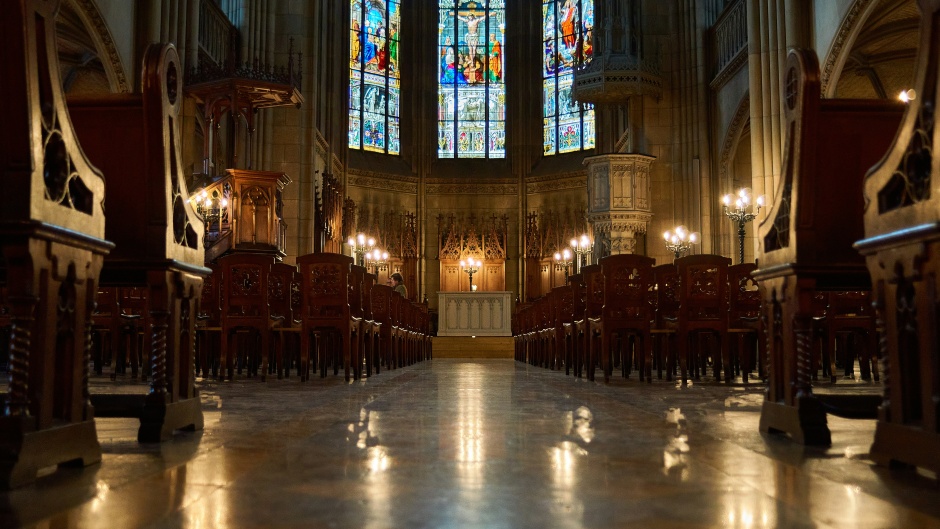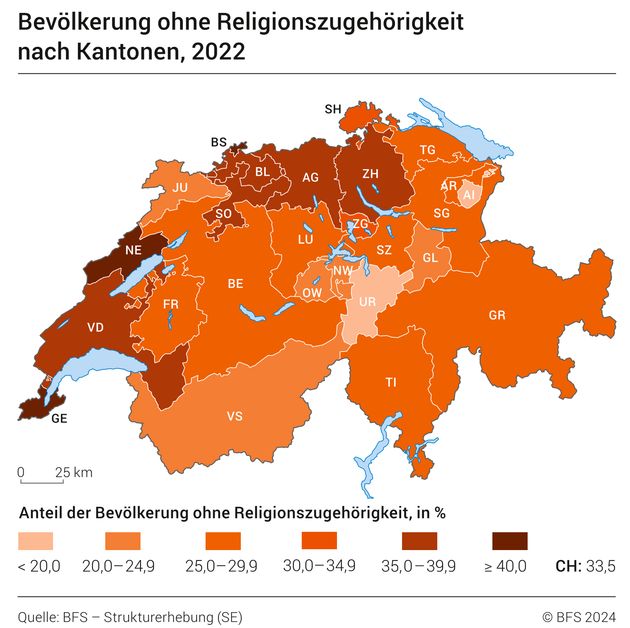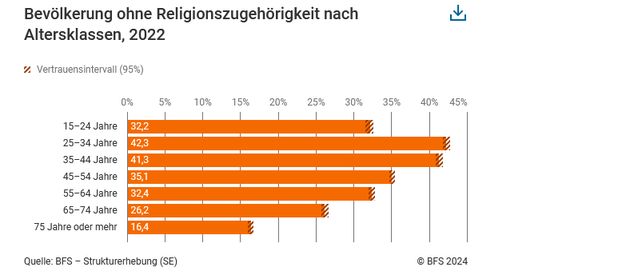Official data show that the number of non-religious people has increased by over 13% since 2010.
 A Roman Catholic Church in Basel-City, the canton with the bigest population of ‘nones'. / Photo: [link] Valeriano[/link], Unsplash CC0.
A Roman Catholic Church in Basel-City, the canton with the bigest population of ‘nones'. / Photo: [link] Valeriano[/link], Unsplash CC0.
For the first time in Switzerland, the number of people with no religious affiliation has overtaken those who belong to a religion, according to the statistics of the Swiss Federal Statistical Office (FSO).
In 2022, with a share of 34%, they are bigger than Roman Catholics (32%) and Reformed Protestants (21%), who have become steadily smaller in recent years. The rest of the surveyed said they were Muslims (5,9%), or belonged to other Christian communities (5,6%).
Over the past 50 years, the proportion of ‘nones’ among the Swiss population has grown steadily. From just 1% in 1970 it rose to 20% in 2010, and since then it has increased more than 13 percentage points more.
The figures vary from Canton to Canton. In Basel-City (56%) and Neuchâtel (53%), people with no religious affiliation make up the majority of the population, while in the central Swiss Cantons of Nidwalden (24%), Obwalden (22%) and Uri (19%) the figure is less than half as high. The lowest proportion of non-believer is found in the Canton of Appenzell Innerrhoden (15%), which has a strong Roman Catholic tradition.

The ‘nones’ are also younger than the rest of the population. Only 16% of people aged 75 and over do not belong to any religion. In terms of proportion, people with no religious affiliation are most strongly represented in the 25-34 age group (42%). Overall, more men have no religious affiliation than women (36% vs 31%).

[photo_footer] Population without religious affiliation by age group. / FSO. [/photo_footer]
The study shows that many have only given up their religion later in life. Around half of them previously belonged to the Roman Catholic Church and 40% to the Protestant Church (the national ERKS).
The main reason for giving up is that they had lost their faith or had never had a faith at all (15% and 17%, according to the study). Another third did not agree with the statements and views on certain issues of the religious community they belonged to.
Furthermore, just less than a third of people with no religious affiliation consider themselves to be somewhat or definitely spiritual.
Religion or spirituality also play a rather or very important role in some situations for people with no religious affiliation, such as in difficult moments in life (28%) or in the event of illness (22%). Around 30% of them do not believe in one or more gods, but in a higher power.
According to this data, evangelical Christians members of free churches (including Baptists, Brethren, Pentecostals, independents...) are counted among the 5.6% of "other Christian communities".
The co-director of the Swiss Evangelical Alliance, told Evangelical Focus in 2020 about the “fast and radical” secularisation process of Switzerland. According to Andi Bachmann-Roth, in Switzerland there are about 200,000 evangelicals (of a population of over 8.7 million people).
“We realise that we are minority now, and that can lead to frustration at times. But in all this retreat, I mainly see an opportunity. It obliges us to ask ourselves again: why are we as Christians here? And what is our mission?”, he said in this interview.
[analysis]
[title]One more year[/title]
[photo][/photo]
[text]At Evangelical Focus, we have a sustainability challenge ahead. We invite you to join those across Europe and beyond who are committed with our mission. Together, we will ensure the continuity of Evangelical Focus and Protestante Digital (Spanish) in 2024.
Learn all about our #OneMoreYearEF campaign here (English).
[/text][/analysis]

Las opiniones vertidas por nuestros colaboradores se realizan a nivel personal, pudiendo coincidir o no con la postura de la dirección de Protestante Digital.
Si quieres comentar o